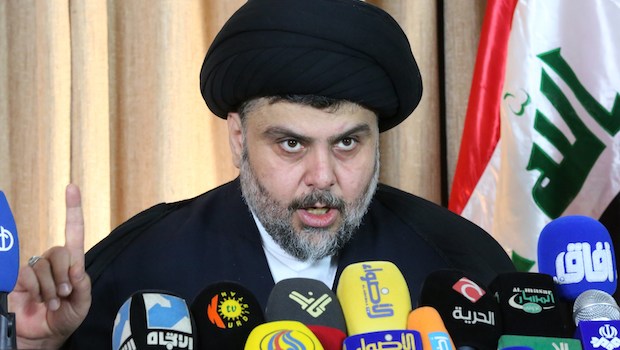
Iraqi Shi’ite cleric Moqtada Al-Sadr delivers a speech from the southern Iraqi city of Najaf on February 18, 2014. (AFP PHOTO/HAIDAR HAMDANI)
Baghdad, Asharq Al-Awsat—A number of Sadrist MPs have resigned from the Iraqi parliament following Shi’ite cleric Moqtada Al-Sadr’s decision to resign from politics last week, threatening to plunge Iraq into another political crisis just months before planned parliamentary elections.
A total of 19 MPs from the Sadrist Al-Ahrar parliamentary bloc have announced their resignation so far, in solidarity with Sadr’s decision, with others threatening to do so. The Sadrist bloc has a total of 41 MPs, in addition to holding six ministerial portfolios.
The latest Al-Ahrar bloc MP to resign, Amir Al-Kanani, held a press conference in Baghdad on Monday to explain his decision.
Kanani said: “I announce my resignation from parliament in solidarity with the decision of the leader of the Sadr Movement, Seyyed Moqtada Al-Sadr, to retire from politics.”
He added that Sadrist Movement ministers and MPs are set to meet in the coming days to make key decisions.
Meanwhile, a leading Sadrist Movement official, speaking to Asharq Al-Awsat on the condition of anonymity because he was not cleared to talk to the media, said: “With the exception of press conferences held to announce parliamentary resignations, we have taken the decision not to make statements to the press.”
The Sadrist official denied that Sadr’s retirement was the result of the ratification of a controversial pensions bill. He said: “The real reason has nothing to do with that. There are more important issues, and according to available information, there is external and internal pressure on Sadr and others to agree to a third term for Maliki, something Sadr strongly rejects.”
Sadr fiercely criticized Iraqi Prime Minister Nuri Al-Maliki in a televised speech on Tuesday, describing him as a “dictator and a tyrant.”
He also accused the Baghdad government of corruption, saying that Maliki is ruling over an Iraq that has “no life, no agriculture, no industry, no services, no security, safety or peace,” saying the Iraqi prime minister is seeking to divide the country based on a sectarian basis.
Despite announcing his retirement from politics, Sadr urged Iraqis to vote in the forthcoming parliamentary elections, due to be held in two months’ time.
Former Prime Minister Iyad Allawi urged Sadr to reconsider his decision to retire from politics. He said: “Our country is passing through crises that become increasingly complicated day by day, a fact which doubles the responsibility of national and Islamic figures to confront this dangerous downturn whatever the sacrifices. We have been shocked by the news of Moqtada Al-Sadr’s decision to retire from politics in protest at the grave deviations of the political process and its reflection on the lives and dignity of Iraqi people.”
“The departure of the Sadrist Movement and the Al-Ahrar parliamentary bloc will leave a grave and dangerous void in the political process, leading to other figures leaving this wretched process that has destroyed the balance in the country.”
Allawi added: “While we understand the reasons and motives of Sadr and his rejection of the terrible political process and share with him all his beliefs . . . Sadr owes it to all Iraqis to reverse his decision and continue in the political process.”
